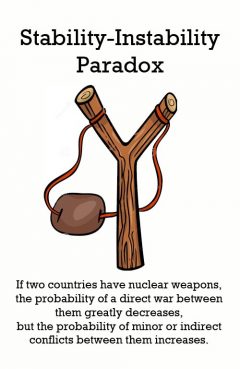Stability-Instability Paradox

Release Date: //
Country of Release:
Length:
MPAA:
Medium: Paradox
Genre:
Release Message: When two countries each have nuclear weapons, the probability of a direct war between them greatly decreases, but the probability of minor or indirect conflicts between them increases.
Description: When two countries each have nuclear weapons, the probability of a direct war between them greatly decreases, but the probability of minor or indirect conflicts between them increases. The stability_instability paradox is an international relations theory regarding the effect of nuclear weapons and mutually assured destruction. It states that when two countries each have nuclear weapons, the probability of a direct war between them greatly decreases, but the probability of minor or indirect conflicts between them increases. This occurs because rational actors want to avoid nuclear wars, and thus they neither start major conflicts nor allow minor conflicts to escalate into major conflictsthus making it safe to engage in minor conflicts. For instance, during the Cold War the United States and the Soviet Union never engaged each other in warfare, but fought proxy wars in Korea, Vietnam, Angola, the Middle East, Nicaragua and Afghanistan and spent substantial amounts of money and manpower on gaining relative influence over the third world. A study published in the journal of conflict resolution in 2009 quantitatively evaluated the nuclear peace hypothesis, and found support for the existence of the stability_instability paradox. The study determined that while nuclear weapons promote strategic stability, and prevent large scale wars, they simultaneously allow for more lower intensity conflicts. When a nuclear monopoly exists between two states, and their opponent does not, there is a greater chance of war. In contrast, when there is mutual nuclear weapon ownership with both states possessing nuclear weapons, the odds of war drop precipitously.